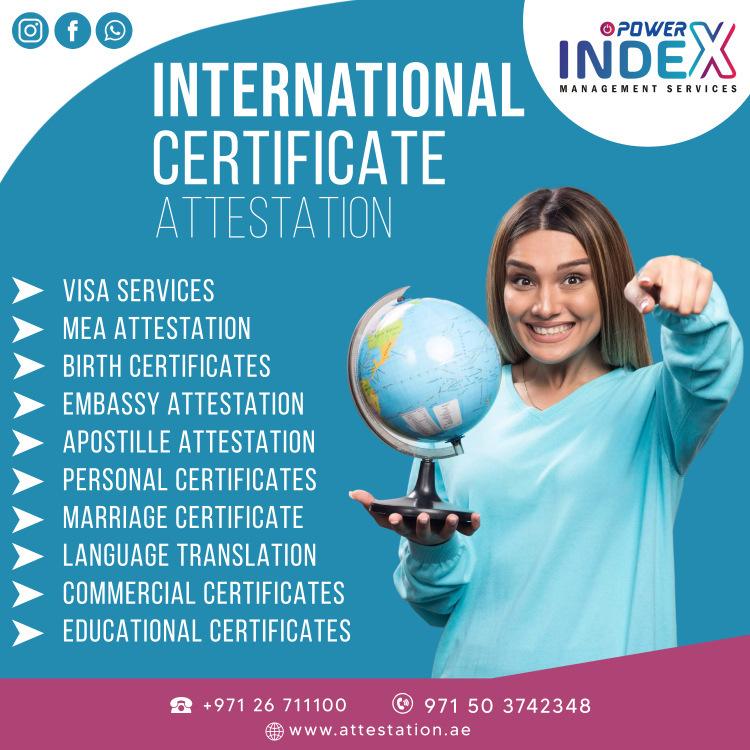Attested certificates play a crucial role in enhancing employability in the United Arab Emirates (UAE). The UAE is known for its high standards and strict regulations when it comes to employment and professional qualifications. Here are several ways in which attested certificates contribute to employability:
- Validation of qualifications: Attested certificates serve as a validation of an individual's educational qualifications, professional skills, and expertise. The attestation process ensures that the certificates are genuine and authentic, providing employers with confidence in the candidate's abilities.
- Compliance with UAE regulations: The UAE has specific requirements for the recognition of educational degrees and professional certifications obtained outside the country. Attesting certificates ensures compliance with these regulations, demonstrating that the qualifications meet the UAE's standards.
- The Ministry of Foreign Affairs: the embassy or consulate of the issuing nation, and possibly other UAE government organisations conduct a thorough verification process as part of the attestation process. This process confirms the authenticity of the certificates and eliminates any doubts about their validity.
- Increased trust and credibility: Employers in the UAE highly value attested certificates as they indicate a candidate's commitment to meeting the country's regulatory standards. Attested certificates establish credibility and trustworthiness, making it easier for employers to make hiring decisions and assess the candidate's suitability for a specific role.
- Access to job opportunities: Many companies and organisations in the UAE explicitly require attested certificates as part of their hiring criteria. Without proper attestation, candidates may be excluded from certain job opportunities or face difficulties competing with candidates who possess attested certificates. By having their certificates attested, individuals open up a wider range of employment prospects in the UAE.
- Work visa facilitation: In order to work legally in the UAE, individuals typically need to obtain a work visa. Attested certificates are often a prerequisite for obtaining a work visa, as they provide evidence of qualifications and are required during the visa application process. Having attested certificates can expedite the visa process and facilitate employment opportunities.
To obtain attested certificates in the UAE, you typically need to follow these steps:
- Verify the requirements: Research and understand the specific requirements for attesting your certificates in the UAE. The requirements may vary depending on the type of certificate, such as educational degrees, professional qualifications, or personal documents.
- Get the documents ready: Gather all the necessary documents for attestation. This typically includes the original certificates, copies of the certificates, identification documents, and any other supporting documents requested by the authorities.
- Attestation process in the home country: The first step is usually to get the certificates attested in your home country. This typically involves the following steps: a. Notarization: Visit a local notary public or solicitor to get the documents notarized. This step ensures that the documents are genuine and authentic. b. Authentication: Submit the notarized documents to the relevant government department or ministry responsible for authentication. The notary public's signature and seal are confirmed in this phase.
- Attestation process in the UAE: Once the documents are attested in your home country, you will need to proceed with the attestation process in the UAE. The steps involved are as follows: a. Ministry of Foreign Affairs (MOFA): Submit the attested documents to the MOFA office in the UAE. They will verify the authenticity of the documents and provide a MOFA attestation stamp. b. Embassy or Consulate: Visit the embassy or consulate of your home country in the UAE and submit the documents for attestation. The embassy or consulate will verify the MOFA attestation and provide their own attestation stamp or seal.
- Translation (if required): If your original certificates are not in Arabic or English, you may need to get them translated by a certified translator in the UAE. The translation should be attested by the Ministry of Justice in the UAE.
- Additional attestations (if required): Depending on the specific requirements, you may need to get your certificates attested by other government entities in the UAE. For example, some professions may require attestation from relevant professional bodies or regulatory authorities.
It's important to note that the exact process and requirements for attestation may vary depending on your specific situation, the type of certificates, and any recent updates to the regulations. It is recommended to consult with a professional service provider or the relevant government authorities in the UAE for the most up-to-date and accurate information regarding the attestation process.
Obtaining certificate attestation is essential for enhancing employability in the UAE. Attested certificates validate qualifications, ensure compliance with UAE regulations, verify document authenticity, establish trust and credibility, provide access to job opportunities, and facilitate the work visa process. Following the necessary steps, such as notarization, authentication, MOFA attestation, embassy or consulate attestation, and potential translation, will help individuals obtain the required attested certificates. It's important to stay informed about the specific requirements and consult with relevant authorities or professional service providers for the most accurate and up-to-date information regarding the attestation process in the UAE.
